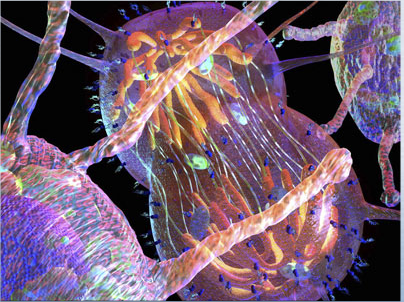From www.smartplanet.com

Unlike normal cells, cancer cells can grow and age without dying — one of the reasons they’re so dangerous. But researchers at Washington State University have developed a way to help cancer cells age and die, which could lead to treatment that slows or stops tumor growth.
The research, by Weihang Chai of the Washington State University School of Molecular Biosciences and colleagues, was reported in the current issue of The EMBO Journal. It was funded in part by the National Institutes of Health and the American Cancer Society. I spoke with Chai this week.
How do cancer cells differ from normal cells in terms of their mortality?The big difference between cancer cells and normal cells is that cancer cells can divide forever and live forever. We call this immortality. The normal cells will divide for a number of divisions and then stop growing. They get old and either they die or they sit there and do nothing. They are mortal.
Cancer cells have a way to maintain their telomeres. Their telomeres don’t get shortened. Each time the normal cells divide they lose some telomere DNA sequences. Eventually when the telomere DNA becomes too short, they stop growing. There are also other factors contributing to the mortality of normal cells.
Is the immortality of cancer cells what makes them so dangerous?
The cancer cells divide uncontrollably. Then you have more and more cancer cells in one location of your body that can invade the surrounding tissues and disrupt the function of the normal tissues. They form the tumor. The cancer cells also can circulate around your body and get into other places and form tumors in the new locations. This is in part due to the immortality of cancer cells. They don’t die. Normal cells grow at one location and at some point they will stop.
Talk about your work on making cancer cells “more mortal.”
The majority of the cancer cells, about 90 percent, they activate a molecule called telomerase. Telomerase is usually not activated in normal cells, except for in stem cells. In cancer cells, the telomerase is active. The function of telomerase is to add telomere DNA at the short telomeres. That’s why cancer cells don’t lose their telomeres. In the normal cells telomerase is off, so there is no way to maintain their telomere length. [This would suggest that] if you kill the telomerase in cancer cells, the telomere [would gradually shorten] and the cancer cells will die.
However, recently we have found that the telomerase extends just one strand of DNA. The other strand should be synthesized by other molecules, other proteins. We found the molecule that’s responsible for synthesizing the other strand. If you block the function of this molecule, then the telomere cannot be maintained properly, so the cell also just stops growing.
We’re just at this stage now. We don’t know how this whole thing works. We’re working on that and hopefully in the future we can design a way to target this process, not directly target telomerase but target the synthesis of the other strand. That’s another way of stopping the cancer cell’s growth.
What’s the next step to move this research forward?
The next step will be to find out how this whole thing is regulated. We’d like to know whether in normal cells the synthesis of the other strand also occurs because you want to specifically target the cancer cells. If this does exist, [we want to know] whether the same process is regulated by different pathways in normal cells compared to cancer cells. Our ultimate goal is to see if there are any specific targets we can inhibit in the cancer cells.
Could this eventually become a treatment for people with cancer?
We hope so. It’s going to be a long way. That probably will involve some other research groups, not just our group.



0 comments:
Post a Comment